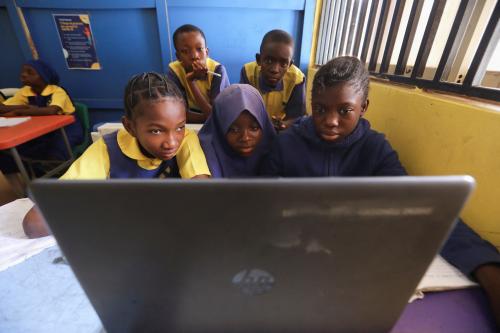Digital technologies launched, in many ways, by the microelectronics revolution and the Information and Communication Technology (ICT) advances which ensued in the 1970s—have had a profound impact on economies around the world. Ranging from frontier technologies such as Artificial Intelligence (AI), the Internet of Things, big data, blockchain, 5G, 3D printing, robotics, drones, gene editing, nanotechnology, and solar photovoltaic—these new technologies have significantly affected the sectors and workplaces of domestic economies around the world. In particular, increased digitalization has resulted in shifts in the nature and functionality of labor markets on both the demand and supply sides. Much of the focus on the relationship between digital technologies and the labour market, however, has been on the developed world. In a world in which digitalization—and the skills associated with digitalization—are becoming increasingly important in the structural transformation of economies, there is limited research aimed at measuring and understanding the nature and extent of digitalization and digital skills gaps in Africa particularly.
Many of the studies to date have focused on advanced economies, primarily investigating the potential effects of digital adoption on labor market disruptions, specifically automation and unemployment concerns. Theoretical and empirical work is much more limited for developing and emerging economies despite having distinct labor market characteristics, as well as being major contributors to the future workforce demographically. Developing and emerging economies overall have higher rates of self-employment and informal employment compared to advanced economies which presents a unique labor market to be affected by digitalization. The African continent in particular should be a key region of study when it comes to labor market disruptions or future of work discussions more broadly (International Labour Organization, 2019). As the world’s youngest continent, Africa will make up one-fifth of the total workforce and one-third of the total youth workforce in the world by 2030, adding 10 to 12 million young people to the workforce each year (Munyati, 2020). With mobile phone subscriptions, internet availability, and innovations in mobile banking increasing in the region, digitalization will play a key role in how labor markets and ultimately economies will function within the region and globally.
The paper has three core components. Firstly, through the proposition that digitalization can be measured in five dimensions ranging from digital finance and digital platforms to digital skills and digital infrastructure, we provide empirical evidence on the changing dynamics since 2007 in Africa across these various dimensions relative to a sample of developed and emerging markets. Secondly, following this descriptive overview of digitalization trends in Africa, we apply the Alkire-Foster measure of multi-dimensional poverty widely in use in poverty analysis to the notion of digitalization in an economy and region. In so doing, we hope to deliver a Digitalization Gap Index and by extension a Digital Skills Gap Index for Africa and for a series of African countries in our sample. Such a Digitalization Gap Index will hopefully empirically anchor our understanding of the digital economy progress with respect to digitalization—and within it, digital skills—in Africa. The final component of the paper serves to develop a richer, unit record-based measure of digital skills combining country-level labor force survey data with a task-based coding system drawn from the U.S. Department of Labor. The paper focuses on the following key questions:
- What is the level of digitization in Africa?
- To what extent is the level of digitization in Africa ahead or behind that of other regions?
- How can we measure digital skills’ demand, supply, and the skills gap?
To consider these questions, we proceed in Section II to provide a brief analytical background locating the notion of digitalization within the broader parameters of structural transformation. Section III provides the methodological and data overview utilized in order to build our Digitalization Gap Index. Section IV provides a descriptive overview of changes in digital infrastructure, digital finance, digital entrepreneurship, digital skills, and digital public sector engagement across the individual indicators informing these dimensions. Section V provides our results for the A-F Digitalization Gap Index. In Section VI we use a case study to introduce an empirical task-based approach to measuring digital skills. Using South Africa as an example, we demonstrate that it is possible to measure the demand and supply of digital skills as well as the digital skills gap, if the relevant data is available. Section VII provides brief policy reflections whilst Section VIII concludes.
The Brookings Institution is committed to quality, independence, and impact.
We are supported by a diverse array of funders. In line with our values and policies, each Brookings publication represents the sole views of its author(s).









